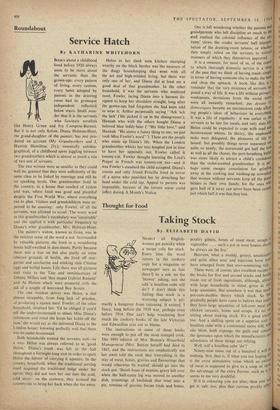Roundabout
Service Hatch
By KATHARINE WHITEHORN
BOOKS about a childhood lived before 1920 always seem to be more about the servants than the grown-ups; every pattern of living, every custom, every habit adopted by patents in the drawing room had its grotesque independent reflection' below stairs. Small .won- der that it is the servants who fascinate novelists like Henry Green and Ivy Compton-Burnett. But it is not only, fiction. Diana Holman-Hunt, the grand-daughter of the painter, has just pro- duced an _account (My Grandmothers and I, Hamish Hamilton, 21s.), essentially autobio- graphical, of a childhood spent juggling between' two grandmothers which is almost as much a tale . of two sets of servants.
The two women Were as unalike as they could well be, granted that they were sufficiently of the same class to be linked by marriage and still be on speaking terms. One grandmother lived in the country, in a house that smelled of violets and wax, where food was good and plentiful despite the First World War, where everything ran to plan. Visitors and grandchildren were ex- pected to be amusing: only Fowler, of all the servants, was allowed to scowl. The worst word in this grandmother's vocabulary was 'unsuitable' and she applied it with particular frequency to Diana's other grandmother, Mrs. Holman-Hunt.
The painter's widow, known as Gran, was in the strictest sense of the word a nut. Surrounded by valuable pictures, she lived in a mouldering house half-swathed in dust-sheets. Partly because there was a war on but also partly on some obscure grounds of health, she lived off mar- garine and saccharine and stinking stale Chinese eggs and boiled bones. Life there was all pictures and visits to the Tate and reminiscences of Johnny Millais and 'that stupid Gabriel Rossetti' and At Homes which were prepared with the aid of a couple of borrowed ,Boy Scouts. The one resident skivyy was Helen, a slut almost incapable, from long lack of practice, of producing a square meal. Fowler, of the other household, despised her. 'I'd be obliged if you'd tell the under-housemaid to steam Miss Diana's velveteens and mind she keeps her kettle off the lace,' she would say as she delivered Diana to the London house; knowing perfectly well that there was no under-housemaid.
Both households treated the servants well—in a way. Helen was always referred to as !good Helen,' Diana's trunk was left in the hall throughout a fortnight-long visit in order to spare Helen the labour of carrying it upstairs. In the country household, when the traditional serving maid acquired the traditional bulge under the apron, they did not turn her out into the cold, cold snow: on the contrary, they scoured the countryside to bring her back when she ran away. Helen in her dank area kitchen stamping wearily on the black beetles was the measure of the dingy housekeeping that went with all the art and high-minded living; but there was only one of her, and Diana did at least see a good deal of that grandmother. In the other household, it was the servants who mattered most. Fowler, lacing Diana into a harness de- signed to keep her shoulders straight, long after the grown-ups had forgotten she had been told ' to wear it; Arthur perpetually saying "Ark 'ark the lark' (We picked it up in the dining-room'); Hannah who with the others bought Diana a beloved blue teddy-bear (' "My little love," said Hannah. "He seems a funny thing to me; we just took Miss Fowler's word" '). These are the people who made up Diana's life. When the London grandmother whisks her into hospital just in time to have her appendix out, Fowler called it tommy-rot; Fowler thought learning the Lord's Prayer in French was tommy-rot too—and it was Fowler's standard the child accepted. Diana's cousin and only friend Priscilla lived in terror of a nurse who punished her by drenching 'her head under the cold tap. Appeal to parents was impossible, because of the torture nurse could inflict during A Month's Notice. and the see' Pre'
bet
ore
One is left wondering whether the parents grandparents who left discipline so much to staff realised the colossal influence of the vants' views, the cruder servants' hall inter tation of the drawing-room taboos; or whe they simply, relied on the servants to ell manners of which they themselves approved It is a measure, for most of us, of the cx to which thorough domestic service is a t of the past that we think of having maids sin in terms of having someone else to make the I and chop the spinach. A book like this reminder that the very existence of servants posed a way of life. It was a life without privi weaknesses, deviations from the social n were all instantly remarked; pas demo domestiques became an unconscious code af ing people's ideas of behaviour in everytt It was' a life of regularity : it was unfair to servants to be late for meals, and only sluts Helen could be expected to cope with mad inconvenient whims. In theory, the unplea tasks were delegated, the pleasures of life tamed; but possibly things never separated quite so neatly; the nursemaid got half the as well as all the chores, the port-breathing h was more likely to attract a child's confid than the' violet-scented grandmother. It is haps some meagre consolation for grin away at the cooking and washing-up nowa that women without servants keep all the bilities in their own hands; for the ones gave half of it away can never have been ce just which half it was that they lost. tent ing itplY beds iS 3
cY: ics at' ink the like and sant out
lo
tier ctlee Per digit Mr! 0551' Oat°


































 Previous page
Previous page